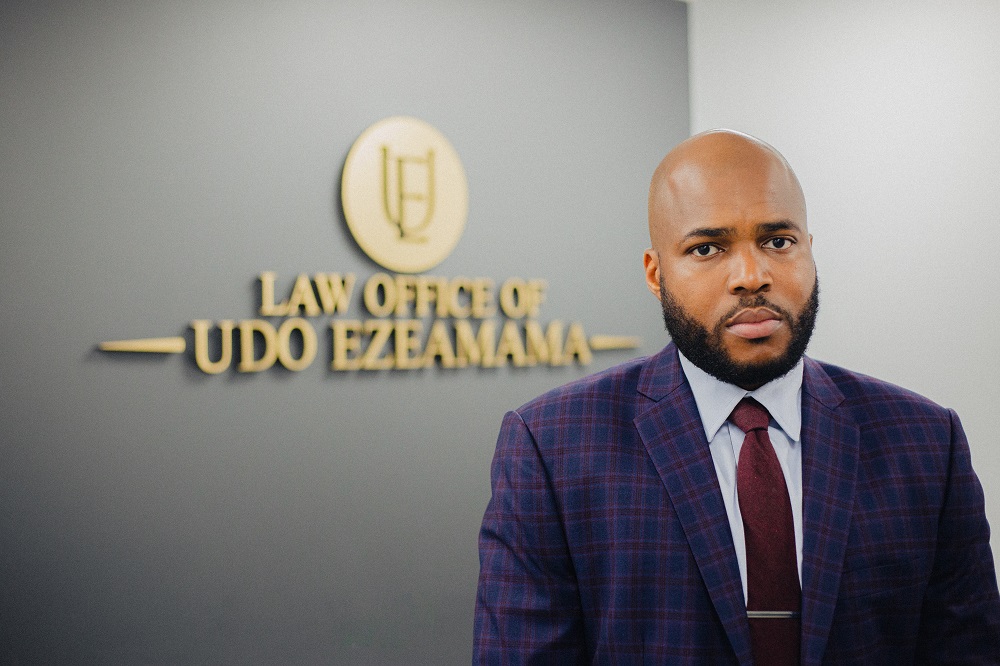Spotlight
Aggressive Representation in Personal Injury Cases: How the Law Office of Udo Ezeamama Fights for Justice

When faced with the aftermath of an accident, victims often find themselves overwhelmed by medical bills, lost wages, and the emotional toll of their injuries. In such moments, having an aggressive personal injury attorney on your side can make all the difference. The Law Office of Udo Ezeamama has built a reputation for its relentless advocacy and unwavering commitment to securing maximum compensation for injury victims in Texas.
Why Aggressive Representation Matters
Insurance companies and opposing parties often try to minimize settlements or deny claims altogether. Without strong legal representation, victims may find themselves pressured into accepting inadequate compensation. Aggressive representation means:
- Conducting thorough investigations to establish liability.
- Challenging insurance companies that attempt to lowball settlement offers.
- Taking cases to trial when necessary to fight for the best possible outcome.
At the Law Office of Udo Ezeamama, clients can expect a strategic, no-nonsense approach to personal injury litigation that levels the playing field against large corporations and insurers.
Types of Personal Injury Cases We Handle
Our firm specializes in a wide range of personal injury cases, including:
- Motor Vehicle Accidents (Car, Truck, Motorcycle, 18-Wheeler Accidents)
- Workplace Injuries
- Slip and Fall Accidents
- Medical Malpractice
- Defective Products (Consumer and Industrial)
- Oilfield and Offshore Accidents
- Plant and Refinery Explosions
- Exposure to Toxic Substances
- Public Transportation Accidents
Our Aggressive Legal Approach
Thorough Case Preparation
We start every case by meticulously gathering evidence, interviewing witnesses, and consulting experts to build a compelling case. Our goal is to present irrefutable proof of negligence that strengthens our clients’ claims.

Negotiating with Insurance Companies
Insurance adjusters are trained to protect their company’s bottom line. Our firm aggressively negotiates settlements to ensure clients receive compensation that truly reflects their injuries, losses, and future needs.
Taking Cases to Trial When Necessary
While many personal injury claims settle out of court, we prepare every case as if it will go to trial. This sends a strong message to insurance companies that we are ready to fight for our clients’ rights in the courtroom if a fair settlement isn’t offered.
Compensation for Personal Injury Victims
Victims of personal injury in Texas may be entitled to compensation for:
- Medical expenses (current and future)
- Lost wages and loss of earning capacity
- Pain and suffering
- Property damage
- Emotional distress
Texas follows a modified comparative negligence rule, meaning victims can recover damages if they are less than 50% at fault for their injuries. However, their compensation will be reduced by their percentage of fault.

Why Choose the Law Office of Udo Ezeamama?
- Proven Track Record: Years of success in securing favorable settlements and verdicts.
- Aggressive Advocacy: Relentless pursuit of justice for injury victims.
- Client-Focused Approach: Compassionate legal support tailored to each client’s needs.
- No Fees Unless We Win: Our firm operates on a contingency fee basis, meaning clients don’t pay unless we secure compensation for them.
Get the Legal Representation You Deserve
If you or a loved one has suffered an injury due to someone else’s negligence, don’t settle for less than you deserve. The Law Office of Udo Ezeamama is committed to fighting aggressively on your behalf to ensure you receive the compensation and justice you are entitled to.
📍 Address: 6464 Savoy Drive, Suite 555, Houston, TX 77036
📞 Phone: (832) 323-9245
🌐 Website: https://www.attorneyudo.com/personal-injury-in-houston-texas/

Final Thoughts
Personal injury claims are complex, and victims deserve a legal team that will not back down in the face of adversity. With the Law Office of Udo Ezeamama, you get a fierce advocate who will stand by your side every step of the way. Don’t navigate this challenging journey alone—reach out today for a free consultation.
Spotlight
How the Law Office of Udo Ezeamama Is Helping Texans Avoid Probate Litigation

In Texas, probate disputes are becoming increasingly common—often erupting at the worst possible time, when families are already grieving. Contested wills, unclear estate documents, and disagreements among beneficiaries regularly push families into long, expensive, emotionally draining court battles.
But across Houston, one law firm is gaining attention for a different approach: preventing probate conflicts before they begin.
Over the past year, the Law Office of Udo Ezeamama has emerged as a trusted guide for Texans seeking to secure their estates and safeguard their families from the strain of litigation. Led by Attorney Udo Ezeamama, the firm focuses on proactive estate planning strategies designed to reduce ambiguity, strengthen legal documents, and create a clear roadmap for loved ones.
“Most probate disputes are avoidable,” Ezeamama explains during a recent conversation with Brio.ng. “They come from unclear intentions, missing documents, or family misunderstandings. When we address those issues early, we protect families from court battles that could have been prevented.”
A Growing Concern in Texas
Legal analysts note a steady rise in probate litigation across the state. As family structures evolve and blended households become more common, disagreements about inheritance are more likely. Additionally, many Texans still rely on outdated wills or informal arrangements that fail to reflect their current circumstances.
According to estate practitioners, this combination creates a legal environment where probate conflict often feels inevitable.
The Preventive Model
The Law Office of Udo Ezeamama approaches the issue differently. Rather than stepping in only after disputes arise, the firm focuses on litigation prevention—a model gaining traction among attorneys who want to help families avoid unnecessary conflict.
Key aspects of this preventive approach include:
1. Drafting stronger, clearer wills and trusts
Every document is crafted with precision to reduce the risk of misinterpretation or legal challenge.
2. Addressing potential disputes early
Clients are encouraged to discuss sensitive issues before they become points of tension.
3. Using trusts and other tools to bypass probate
By reducing the number of assets that pass through probate court, families also reduce opportunities for conflict.
4. Protecting against undue influence claims
Thorough documentation ensures the client’s intentions are well-supported and defensible.
5. Guiding executors on legal responsibilities
Many probate lawsuits arise from avoidable mistakes. The firm provides step-by-step guidance to help executors administer estates correctly.

The Human Side of Probate
Behind the legal procedures lies a deeper truth: probate litigation often fractures families. Siblings stop speaking to one another. Parents and adult children enter bitter disputes. Assets that were meant to provide comfort in a time of loss instead become the center of lasting resentment.
Ezeamama views his work as part legal service, part conflict prevention.
“Probate isn’t just about property—it’s about family,” he says. “We’re here to protect both.”
Why This Approach Matters Now
With an aging population and more Texans owning property across state lines, the need for clear estate planning has never been greater. Lawyers across the state report an uptick in contested wills, especially in cases where the deceased left no clear instructions.
By focusing on prevention, the Law Office of Udo Ezeamama is helping families save time, money, and emotional strain. And for many Texans, that guidance comes at exactly the moment they need it most.
A Steady Voice in a Complicated System
The probate system can feel overwhelming, even for those familiar with legal processes. But for families navigating grief, financial uncertainty, and complex relationships, the stakes are even higher.
Through education, personalized planning, and clear communication, the Law Office of Udo Ezeamama is bringing clarity to an area of law often defined by confusion and conflict.
For Texans looking to protect their families’ future, the message from Ezeamama is simple:
Plan early, plan clearly, and seek guidance you can trust.
Spotlight
Abii & Associates Launches New Houston Office to Expand Legal Support Across Southeast Texas

In a strategic move to better serve its growing client base, Texas law firm Abii & Associates has opened a new office in the heart of Houston. Located at 7322 Southwest Freeway, Suite 1639, Houston, TX 77074, the new office is expected to significantly improve access to legal services for residents, entrepreneurs, and businesses in the Greater Houston area.
The firm, which has already established a strong presence in Pearland and Cypress, is known for its comprehensive legal solutions in business and corporate law, real estate transactions, bankruptcy, probate and estate planning, and immigration law.
“This expansion reflects our long-term commitment to the Houston market,” said a senior attorney at Abii & Associates. “We’re proud to offer local, in-person consultations and ongoing support to clients navigating complex legal decisions.”
Serving Houston’s Diverse Legal Needs
The new Houston office is positioned to meet the increasing demand for legal representation from small business owners, real estate investors, families, and professionals throughout the metro area. In recent years, Houston’s economic and population growth has sparked a rising need for legal support in areas like:
- Business formation and corporate advisory
- Commercial lease and contract negotiations
- Real estate closings and title disputes
- Chapter 7 and Chapter 13 bankruptcy filings
- Estate planning, wills, and probate proceedings
- Investor and family-based immigration services
By opening this location, Abii & Associates can now provide more immediate, personalized service to clients in Sugar Land, Bellaire, Stafford, Missouri City, and central Houston.
A Firm Known for Strategic Counsel and Accessibility
Clients of Abii & Associates often highlight the firm’s straightforward, client-first approach. Unlike firms that treat cases as transactions, Abii & Associates builds long-term relationships, providing ongoing legal guidance that evolves with the client’s needs.
“We make sure our clients understand every step, every risk, and every opportunity in front of them,” a spokesperson said. “This Houston office allows us to deliver that same level of care—locally and conveniently.”
Schedule a Consultation
Clients interested in speaking with a Houston-based attorney can now schedule consultations by phone or email. The firm offers both weekday and limited weekend availability.
📍 Address: 7322 Southwest Freeway, Suite 1639, Houston, TX 77074
📧 Email: houston@abiilegal.com
📞 Phone: +1 (346) 849-3888
🌐 Website: www.abiilegal.com
About Abii & Associates
Abii & Associates is a full-service Texas law firm offering legal representation in business law, real estate, bankruptcy, estate planning, and immigration. With a mission to make law more strategic, accessible, and personal, the firm serves clients across Houston, Pearland, Cypress, and surrounding communities.
Spotlight
Mokolo Law Firm Expands Footprint with New San Antonio Office Dedicated to Immigration Law

In a strategic move to extend its reach and better serve Texas residents navigating immigration challenges, Mokolo Law Firm has officially opened a new office in San Antonio. Located at 2346 E Commerce St, the office is now welcoming clients seeking immigration legal services, offering experienced counsel and a client-first approach.
With growing demand for localized immigration support, the firm’s expansion to San Antonio marks a significant step in providing accessible legal guidance to individuals and families in the region.
“Many San Antonio residents face complex immigration issues, and we wanted to bring our services closer to them,” said Attorney Uzo J. Mokolo, founder of Mokolo Law Firm. “This new office is about being present, being accessible, and standing alongside clients as they work toward their legal goals.”

Mokolo Law Firm has built a reputation for its clear communication, strong advocacy, and results-driven representation in both immigration and family law matters. The firm’s San Antonio team will handle a wide range of immigration cases, including family-based petitions, green cards, citizenship applications, asylum, deportation defense, and humanitarian visa options such as U-visas and VAWA.
The San Antonio office joins the firm’s existing locations in Houston and Fort Bend, deepening its regional coverage while maintaining the personalized support that has defined its practice.
Residents in need of immigration legal services can now schedule a consultation by calling 210-670-6623 or visiting www.mokololaw.com.
Office Address: 2346 E Commerce St, San Antonio, TX 78203
Phone: 210-670-6623
For more information, visit: https://www.mokololaw.com/practice/immigration-lawyer-in-san-antonio
-

 News1 week ago
News1 week agoUkrainian Community Mourns Miners Killed in Strike as Rescue Efforts and International Condemnation Grow
-

 News1 week ago
News1 week agoTrump Nominates Kevin Warsh to lead the US Federal Reserve
-

 Entertainment1 week ago
Entertainment1 week agoFela Kuti Makes History as First African Honoured With Grammys Lifetime Achievement Award
-

 Entertainment1 week ago
Entertainment1 week agoCatherine O’Hara, star of Schitt’s Creek and Home Alone, dies at 71
-

 News1 week ago
News1 week agoOpposition Demands Inquiry as Mandelson Steps Away from Labour Amid Epstein Document Fallout
-

 Business6 days ago
Business6 days agoChina bans hidden car door handles over safety concerns
-

 News6 days ago
News6 days agoClintons Agree to Testify in Epstein Probe as Congress Pauses Contempt Push
-

 News5 days ago
News5 days agoAndrew and Epstein asked exotic dancer for ‘sex acts,’ legal letter claims










